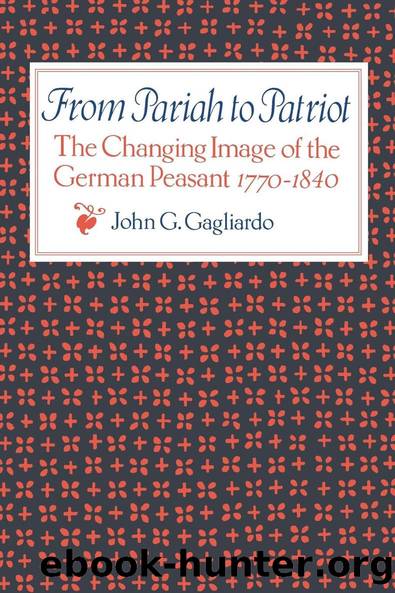From Pariah to Patriot: The Changing Image of the German Peasant 1770-1840 by John G. Gagliardo

Author:John G. Gagliardo [Gagliardo, John G.]
Language: eng
Format: epub
ISBN: 9780813152257
Goodreads: 22351387
Publisher: University Press of Kentucky
Published: 2014-07-15T00:00:00+00:00
The revolutionary period, in sum, intensified the attention focused on the peasant by the German upper classes. Not only did it lend renewed hope for basic agrarian reforms to radical publicists who had damned the oppressiveness of the agrarian constitution for some time already, but it also provided a clear reason for reform to some conservative groups which had previously been loath to admit their necessity. But among both moderates and conservatives, it had the perhaps even more significant effect of raising up an image of the peasant as the defender of the fatherland. Now, âfatherlandâ was grasped somewhat differently by each group: sometimes it was the new and as yet ill-defined nationalist impulse which came to the fore, and at other timesâespecially with the conservativesâit was the old regime of territorial constitutions and a feudal social order which was meant. But however it was conceived, the proportions of the presumed internal threat of revolution and the quite well recognized external menace of foreign invasion caused a new concern to win the allegiance of the peasant to this variously understood fatherland. In the course of the attempt to do this, a picture of the peasantry as the great line of defense against foreign domination was created by those who hoped it was true and accurate. In so doing, they merged their ideas with other streams of thought, already discussed in earlier chapters, which were finding a new importance in the peasant; suffice it to recall that it was the 1790s which witnessed the hitherto most direct associations of the peasant with the German national character. Certainly these associations themselves gained much from the fact that the threats to Germany during the revolutionary period were after all also French threats. There can be little question but that the growth of sentiment favorable to the peasant was reinforced among the conservatives by their attempt to embrace the peasant for their cause; it helped not only to create a certain willingness to reform on the part of landlords, but also to provide virtually the first occasion for a really new look at the peasant (if for the most part only a fearful one) by his noble lord.
At the same time, however, liberal and moderate groups had taken a long step towards the realization of the social implications of the increasing identification of peasant with ânation.â Their slaps at the nobility, cautious and academic though many of them may have been, and for the most part certainly not revolutionary in intent, were extremely important in casting doubt on the traditional claims of the aristocracy to represent the peasant in all public business. The sharpest kind of difference was sketched out between the respective roles of noble and peasant in society. It was the peasant, not the noble, who possessed the morality and performed the social functions which were truly ânobleâ according to the new definitions now put forward; it was the peasant, not the noble, who was the nation. It was not far from
Download
This site does not store any files on its server. We only index and link to content provided by other sites. Please contact the content providers to delete copyright contents if any and email us, we'll remove relevant links or contents immediately.
Room 212 by Kate Stewart(5095)
The Crown by Robert Lacey(4795)
Endurance: Shackleton's Incredible Voyage by Alfred Lansing(4747)
The Iron Duke by The Iron Duke(4341)
The Rape of Nanking by Iris Chang(4193)
Joan of Arc by Mary Gordon(4085)
Killing England by Bill O'Reilly(3989)
Say Nothing by Patrick Radden Keefe(3971)
I'll Give You the Sun by Jandy Nelson(3423)
Shadow of Night by Deborah Harkness(3348)
Hitler's Monsters by Eric Kurlander(3323)
Mary, Queen of Scots, and the Murder of Lord Darnley by Alison Weir(3194)
Blood and Sand by Alex Von Tunzelmann(3184)
Eleanor & Park by Rainbow Rowell(3144)
Darkest Hour by Anthony McCarten(3114)
Margaret Thatcher: The Autobiography by Thatcher Margaret(3070)
Book of Life by Deborah Harkness(2915)
Red Famine: Stalin's War on Ukraine by Anne Applebaum(2913)
The One Memory of Flora Banks by Emily Barr(2851)
